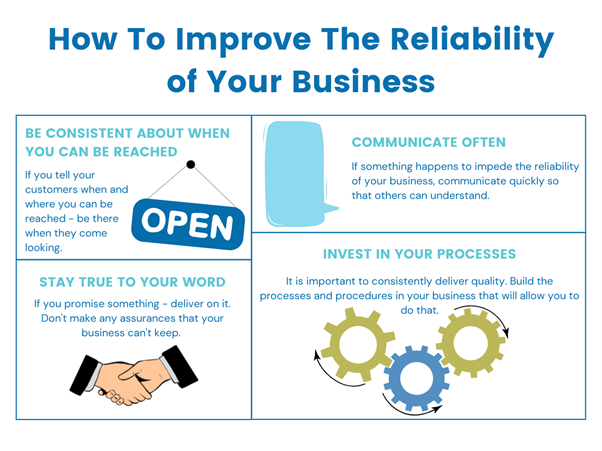How Reliable Is This Business?
When choosing a business to work with, reliability is one of the most crucial factors to consider. A reliable company builds trust, maintains consistency, and delivers high-quality services. Whether you’re a customer, partner, or investor, assessing a business’s reliability ensures you make the right decisions.
In this guide, we’ll explore key factors that determine business reliability, ways to measure it, and how businesses can improve their credibility.

What Defines a Reliable Business?
A reliable business consistently delivers on its promises, meets deadlines, and provides high-quality products or services. The following characteristics define a truly dependable company:
- Strong Reputation – Positive reviews, testimonials, and a track record of success.
- Consistency in Quality – Providing the same level of service every time.
- Financial Stability – A company that manages finances well is more likely to stay in business long-term.
- Customer Satisfaction – High ratings and repeat customers indicate trust.
- Transparent Communication – Open, honest, and timely responses to customer inquiries.
Businesses that focus on these elements are more likely to establish long-term success and customer loyalty.
How to Measure Business Reliability?
To determine how reliable a company is, you can evaluate it based on several key metrics:
1. Customer Reviews & Testimonials
- Online reviews on Google, Trustpilot, or Yelp can reveal customer experiences.
- Testimonials from real users indicate how well a business meets expectations.
- A company with consistently high ratings demonstrates reliability and trustworthiness.
2. Business Certifications & Industry Standards
- Certifications from regulatory bodies indicate a company’s commitment to quality.
- ISO standards and compliance certifications prove adherence to industry best practices.
- Businesses that meet these requirements showcase professionalism and accountability.
3. Delivery & Response Time
- Reliable companies stick to deadlines and fulfill commitments.
- Tracking customer complaints about delayed deliveries or unfulfilled orders can indicate reliability issues.
- Companies that respond promptly to inquiries and issues are more dependable.
4. Financial Health & Stability
- A business’s credit rating and financial reports show its economic strength.
- Companies with steady revenue growth and no major financial issues are more stable.
- Investors and partners often check a company’s financial history before collaborating.
5. Customer Retention Rate
- A high percentage of returning customers signifies trust and satisfaction.
- Businesses that consistently attract repeat clients are more dependable.
- A company with low churn rates typically offers consistent quality.
Signs of an Unreliable Business
While many businesses claim to be trustworthy, certain red flags can indicate unreliability.
1. Poor Customer Reviews & Complaints
A business with numerous unresolved complaints or negative feedback may not prioritize customer satisfaction.
2. Lack of Transparency
If a company avoids sharing pricing, policies, or company details, it may be hiding something. Transparency is essential for trust.
3. Frequent Delays or Unmet Promises
If a business repeatedly misses deadlines, delivers faulty products, or cancels services, it’s a sign of operational instability.
4. No Industry Recognition or Accreditation
Reliable businesses earn certifications, industry awards, and positive media coverage. A lack of these credentials may indicate an unproven company.
5. Poor Communication
Businesses that ignore customer inquiries, delay responses, or provide vague answers often struggle with reliability.
How Can Businesses Improve Their Reliability?

Building a reliable business requires continuous improvement and customer focus. Here are practical steps to enhance credibility:
1. Deliver Consistent Quality
- Set clear quality control measures to maintain product/service standards.
- Regularly train employees to ensure they meet company expectations.
- Invest in customer feedback systems to identify and fix quality issues.
2. Be Transparent & Honest
- Clearly state pricing, policies, and service terms.
- Own up to mistakes and resolve customer issues promptly.
- Maintain open communication channels with customers, partners, and employees.
3. Improve Response Time & Customer Service
- Offer 24/7 support through chat, email, or phone.
- Train employees to handle customer concerns professionally and efficiently.
- Automate responses for faster engagement and problem resolution.
4. Strengthen Financial Stability
- Maintain a healthy cash flow and proper financial planning.
- Minimize unnecessary expenses to ensure business sustainability.
- Build strong relationships with investors and financial institutions.
5. Gain Industry Certifications & Recognition
- Obtain ISO certifications and other relevant industry approvals.
- Get featured in business publications and industry reports.
- Apply for business awards to showcase reliability and excellence.
6. Leverage Technology for Automation
- Use automation tools for customer service, social media, and operations.
- Implement CRM systems to track and improve client interactions.
- Platforms like DUYTHIN.DIGITAL help businesses automate processes, ensuring efficiency and reliability.
FAQs About Business Reliability
1. How do customers determine if a business is reliable?
Customers look at reviews, testimonials, response time, and service quality to assess a company’s reliability. Businesses with transparent policies and consistent delivery are more trustworthy.
2. Can a business recover from a damaged reputation?
Yes! Companies can repair their reputation by addressing issues, improving service quality, and being transparent with customers. Consistent improvements can rebuild trust over time.
3. What industries require high reliability?
All industries need reliability, but finance, healthcare, manufacturing, and technology require strict dependability due to customer expectations and regulatory standards.
4. How can automation improve business reliability?
Automation ensures faster response times, better organization, and reduced errors. Platforms like DUYTHIN.DIGITAL help companies automate tasks such as bulk messaging, data scraping, and SEO, improving efficiency.
5. Why do some businesses fail despite having great products?
A company’s success isn’t just about products—customer service, transparency, and operational stability also play key roles. Businesses that neglect these areas often struggle to retain customers.
Final Thoughts: Is This Business Reliable?
A business’s reliability is measured by consistency, customer satisfaction, and operational excellence. Companies with strong reputations, financial stability, and transparent policies are more likely to succeed long-term.
If you’re looking to enhance your company’s efficiency and reliability, leveraging automation tools like DUYTHIN.DIGITAL can streamline operations and build customer trust.
Want to ensure business success and credibility? Explore DUYTHIN.DIGITAL for automation solutions that help businesses scale reliably and effectively!